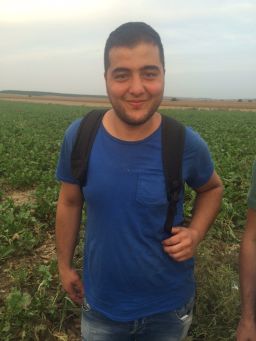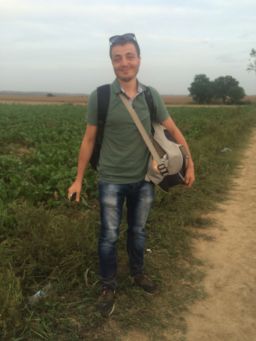Story highlights
Croatia opens its borders to refugees and migrants
"We will treat the refugees humanely," Croatia's interior minister says
Hungary's closing of its borders spurred the migrants' move into Croatia
“Come on guys, don’t be scared,” a Croatian police officer says as he urges a dozen worried migrants and refugees to step across the border into his country.
Again and again Wednesday, this scene repeated itself in cornfields straddling the non-demarcated border between Serbia and Croatia. People who have endured so much worried and wondered whether they should take those fateful steps.
Many did. By evening, the initial trickle of people who trudged on a dusty dirt road in the direction of Croatia had swelled into a steady stream.
Each batch of new arrivals paused for a few minutes until Croatian police officers escorted them into waiting police vans that would take them to a transit center for registration.
Croatia’s open-door policy stands in sharp contrast to neighboring Hungary, where authorities have used tear gas and water cannons to push back migrants and refugees.
“We will treat the refugees humanely,” Croatian Interior Minister Ranko Ostojic announced Wednesday on a government Twitter account. “The ones who are seeking asylum will go to centers… If it’s necessary, we’ll organize routes for passage.”
This sentiment was echoed Wednesday by Zagreb Mayor Milan Bandic, who appealed to residents of the Croatian capital to open their homes to host families of refugees.
Hungary’s closed borders prompt migrant shift

Up until a few days ago, more than 100,000 migrants and refugees had been making their long way into Europe by first streaming into Greece by sea, taking buses and trains through the Balkans, and then walking across the border from Serbia into Hungary.
But there is no set-in-stone migrant trail. That’s why, barely a day after Hungary closed its borders, immigrants began exploring a new corridor into Croatia.

“Three hours ago, we learned that they opened the (Croatian) border,” said Mukhis Masttat, a 26-year-old man from the Syrian city of Aleppo who had just arrived with his brother and cousin at the Croatian border.
“We heard from the news and Facebook,” he said, with a laugh. “Actually we were planning to go to Hungarian border, but we heard that they closed the border and nobody can cross there.”
Unlike Hungary, Croatia still bares the scars of the wars waged in the Balkans after the collapse of Yugoslavia. There were warnings issued on Wednesday about the dangers of migrants possibly wandering into minefields that still have not been made safe since the conflict.
But up to now, Croatia had not experienced the flood of migrants – more than 100,000 in Hungary’s case – who have streamed across borders of various European nations.
‘We are following the people’
While many of the migrants say they are trying to reach wealthier European countries like Germany, Sweden and Finland, some admit that they are merely flowing with this wave of humanity.
“We are following the people,” said 26-year-old Mukhis Masttat.

He and his brother said they understood why some European countries have expressed alarm at the flood of immigrants heading in their direction.
“And most of them are not from Syria,” said his 27-year-old cousin, Yusuf Abudan, who suggested that Afghans and Iraqis are posing as Syrians at international borders.
Masttat understands that none of these countries have to open their doors to people like him. If they don’t, he’s prepared to continue his journey.
“If no countries want to receive us,” he said, “if we feel we are not welcome, then of course we will go back home.”

